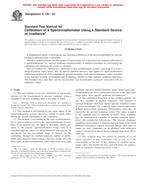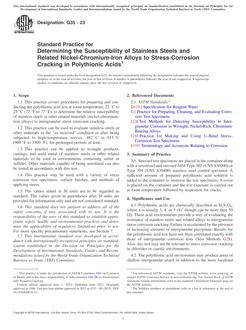
ASTM G138-03
1.1 This test method covers the calibration of spectroradiometers for the measurement of spectral irradiance using a standard of spectral irradiance that is traceable to NIST.
Note 1 – Although NIST is referenced throughout this standard, it should be assumed that other internationally recognized standards laboratories may be substituted.
1.2 This method is not limited by the input optics of the spectroradiometric system. However, choice of input optics affects the overall uncertainty of the calibration.
1.3 This method is not limited by the type of monochromator or optical detector used in the spectroradiometer system. Parts of the method may not apply to determine which parts apply to the specific spectroradiometer being used. It is important that the choice of monochromator and detector be appropriate for the wavelength range of interest for the calibration. Though the method generally applies to photodiode array detector based systems, the user should note that these types of spectroradiometers often suffer from stray light problems and have limited dynamic range. Diode array spectroradiometers are not recommended for use in the ultraviolet range unless these specific problems are addressed.
1.4 The calibration described in this method employs the use of a standard of spectral irradiance. The standard of spectral irradiance must have known spectral irradiance values at given wavelengths for a specific input current and clearly defined measurement geometry. Uncertainties must also be known for the spectral irradiance values. The values assigned to this standard must be traceable to NIST. These standards may be obtained from a number of national standards laboratories and commercial laboratories. The spectral irradiance standards consist mainly of tungsten halogen lamps with coiled filaments enclosed in a quartz envelope, though other types of lamps are used. Standards can be obtained with calibration values covering all or part of the wavelength range from 200 to 4500 nm.
1.5 This standard does not purport to address all of the safety concerns, if any, associated with its use. It is the responsibility of the user of this standard to establish appropriate safety and health practices and determine the applicability of regulatory limitations prior to use.
Product Details
- Published:
- 06/10/2003
- Number of Pages:
- 8
- File Size:
- 1 file , 110 KB

